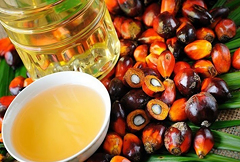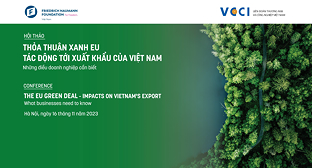EU’s dropping anti-dumping duties could help Malaysia
28/03/2018 12:00

Malaysia has a stronger base to challenge any planned measures by the European Union (EU) to ban the country’s palm oil products after the bloc removed anti-dumping duties for biodiesel products from Argentina and Indonesia.
The European Court of Justice (ECJ) in September 2016 ruled that the imposition of additional duties on biodiesel products was illegal. The ECJ’s decision ended five years of legal wrangling, after the EU decided against appealing the decision early this year.
The decision led to the drop in anti-dumping duties on biodiesel imports from 13 producers originating from Argentina and Indonesia. Besides the ECJ, the World Trade Organisation (WTO) had also ruled against such tariff.
Economist Prof Yeah Kim Leng said the favourable ruling by the ECJ, the EU’s highest court, to eliminate duties of between 8.8% and 23.3% on biodiesel imports could set a precedent for palm oil-producing countries to make their case.
“Given the verdict, I think Malaysia will stand a chance to argue on a similar basis that the ruling is discriminatory, particularly against single products like the palm oil,” Yeah told The Malaysian Reserve (TMR).
Under the EU’s revised plan to promote a greater use of renewable energy (RE) by 2030, European lawmakers approved draft measures to omit the use of palm oil in motor fuels from 2021. The move by the largest importer of palm oil has been labelled as a form of “crop apartheid” by Putrajaya.
Malaysia, the world’s second-largest palm oil producer after Indonesia, had said it would intensify efforts to voice strong concerns to the WTO on the discriminatory policy.
But Yeah said the move to get the WTO’s backing would be time-consuming and could only come after the case has been presented to the international trade body.
Asian Strategy and Leadership Institute research and business development director Lau Zheng Zhou said the European Parliament’s (EP) vote to exclude biofuels produced from palm oil was not final.
Lau said the decision could be influenced by public sentiment and popularity issue.
“The ‘food vs fuel’ debate is still going on, with certain countries like France and the UK rai-sing concerns over investors’ confidence, while others point towards the harmful impact on land use, particularly on the sustainable production of food.
“The EP will get to vote again after the trilogue negotiations between the EP, the EU Council and the Commission, with its compromised position.
“Therefore, I think the EU’s decision on the renewed directive is shaped more internally, than being directed by WTO,” Lau told TMR.
Lau said until Malaysia lodges an official complaint to the WTO pending EU’s final decision, the trade organisation is unlikely to make a formal statement on the matter.
“The interpretation of protectionism is also tricky, given that the EU does not single out any country and that the issue is framed as meeting RE targets.
“On WTO’s side, I think the panel will decide based on technicalities rather than picking sides based on subjective arguments,” he said.
Palm oil exports to the EU are a key source of revenue for Malaysia. In 2017, 15% or two million tonnes of Malaysian palm oil exports worth RM10.3 billion entered the EU.
Malaysia and Indonesia, producers of nearly 90% of the world’s palm oil, said there should be fair treatment for all vegetable oils.
The European Court of Justice (ECJ) in September 2016 ruled that the imposition of additional duties on biodiesel products was illegal. The ECJ’s decision ended five years of legal wrangling, after the EU decided against appealing the decision early this year.
The decision led to the drop in anti-dumping duties on biodiesel imports from 13 producers originating from Argentina and Indonesia. Besides the ECJ, the World Trade Organisation (WTO) had also ruled against such tariff.
Economist Prof Yeah Kim Leng said the favourable ruling by the ECJ, the EU’s highest court, to eliminate duties of between 8.8% and 23.3% on biodiesel imports could set a precedent for palm oil-producing countries to make their case.
“Given the verdict, I think Malaysia will stand a chance to argue on a similar basis that the ruling is discriminatory, particularly against single products like the palm oil,” Yeah told The Malaysian Reserve (TMR).
Under the EU’s revised plan to promote a greater use of renewable energy (RE) by 2030, European lawmakers approved draft measures to omit the use of palm oil in motor fuels from 2021. The move by the largest importer of palm oil has been labelled as a form of “crop apartheid” by Putrajaya.
Malaysia, the world’s second-largest palm oil producer after Indonesia, had said it would intensify efforts to voice strong concerns to the WTO on the discriminatory policy.
But Yeah said the move to get the WTO’s backing would be time-consuming and could only come after the case has been presented to the international trade body.
Asian Strategy and Leadership Institute research and business development director Lau Zheng Zhou said the European Parliament’s (EP) vote to exclude biofuels produced from palm oil was not final.
Lau said the decision could be influenced by public sentiment and popularity issue.
“The ‘food vs fuel’ debate is still going on, with certain countries like France and the UK rai-sing concerns over investors’ confidence, while others point towards the harmful impact on land use, particularly on the sustainable production of food.
“The EP will get to vote again after the trilogue negotiations between the EP, the EU Council and the Commission, with its compromised position.
“Therefore, I think the EU’s decision on the renewed directive is shaped more internally, than being directed by WTO,” Lau told TMR.
Lau said until Malaysia lodges an official complaint to the WTO pending EU’s final decision, the trade organisation is unlikely to make a formal statement on the matter.
“The interpretation of protectionism is also tricky, given that the EU does not single out any country and that the issue is framed as meeting RE targets.
“On WTO’s side, I think the panel will decide based on technicalities rather than picking sides based on subjective arguments,” he said.
Palm oil exports to the EU are a key source of revenue for Malaysia. In 2017, 15% or two million tonnes of Malaysian palm oil exports worth RM10.3 billion entered the EU.
Malaysia and Indonesia, producers of nearly 90% of the world’s palm oil, said there should be fair treatment for all vegetable oils.
Source: www.blackseagrain.net
Các tin khác
- Shrimp exports to major markets bounce back (22/04/2024)
- Vietnam becomes biggest rice supplier for Singapore (22/04/2024)
- Vietnam proposes removal of quota on shrimp export to RoK (22/04/2024)
- Early warnings reduce risks in trade defense (22/04/2024)
- Rubber exports are flourishing, promising potential (22/04/2024)
 Home
Home
 About Us
About Us




















